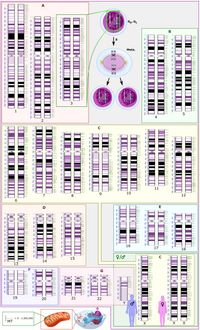
Photo from wikipedia
Pleuropneumonia is one of the most relevant respiratory infections in the swine industry. Despite Actinobacillus pleuropneumoniae (APP) being one of the most important pathogens in the pig production, this is… Click to show full abstract
Pleuropneumonia is one of the most relevant respiratory infections in the swine industry. Despite Actinobacillus pleuropneumoniae (APP) being one of the most important pathogens in the pig production, this is the first comparative study including all available whole genome sequencing data from NCBI. ABSTRACT Actinobacillus pleuropneumoniae (APP) is the causative agent of pleuropneumonia in pigs, one of the most relevant bacterial respiratory diseases in the swine industry. To date, 19 serotypes have been described based on capsular polysaccharide typing with significant virulence dissimilarities. In this study, 16 APP isolates from Spanish origin were selected to perform antimicrobial susceptibility tests and comparative genomic analysis using whole genome sequencing (WGS). To obtain a more comprehensive worldwide molecular epidemiologic analyses, all APP whole genome assemblies available at the National Center for Biotechnology Information (NCBI) at the time of the study were also included. An in-house in silico PCR approach enabled the correct serotyping of unserotyped or incorrectly serotyped isolates and allowed for the discrimination between serotypes 9 and 11. A pangenome analysis identified the presence or absence of gene clusters to be serotype specific, as well as virulence profile analyses targeting the apx operons. Antimicrobial resistance genes were correlated to the presence of specific plasmids. Altogether, this study provides new insights into the genetic variability within APP serotypes, correlates phenotypic tests with bioinformatic analyses and manifests the benefits of populated databases for a better assessment of diversity and variability of relatively unknown pathogens. Overall, genomic comparative analysis enhances the understanding of transmission and epidemiological patterns of this species and suggests vertical transmission of the pathogen, including the resistance genes, within the Spanish integrated systems. IMPORTANCE Pleuropneumonia is one of the most relevant respiratory infections in the swine industry. Despite Actinobacillus pleuropneumoniae (APP) being one of the most important pathogens in the pig production, this is the first comparative study including all available whole genome sequencing data from NCBI. Moreover, this study also includes 16 APP isolates of Spanish origin with known epidemiological relationships through vertical integrated systems. Genomic comparisons provided a deeper understanding of molecular and epidemiological knowledge between different APP serotypes. Furthermore, determination of resistance and toxin profiles allowed correlation with the presence of mobile genetic elements and specific serotype, respectively.
Journal Title: Microbiology Spectrum
Year Published: 2022
Link to full text (if available)
Share on Social Media: Sign Up to like & get
recommendations!